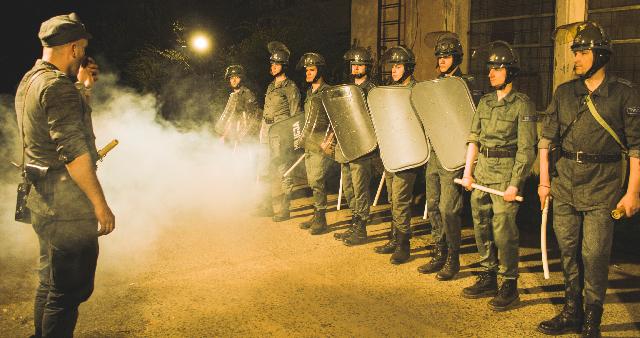The issue of martial law is something that comes up from time to time, usually when we see some sort of governmental overreach, where agents of our government, at whatever level, use heavy-handed actions to stifle the voice of their opposition.
A perfect example of this was when Canadian Prime Minister, Justin Trudeau, ordered the police to dismantle the truckers’ protest. As best I know, they didn’t do anything illegal, unless it is illegal to block bridges and roads in Canada. Even if that is illegal, the actions taken are heavy-handed for the crime, especially since the Prime Minister didn’t even meet with them to hear their grievances.
This is not what martial law is supposed to be. Originally, the term referred to the military taking over from the government, on a temporary basis, for the protection of the people, when the government was unable to meet their prime obligation of protecting the people. But I have never seen it used in that way.
During a SHTF situation, pain could become an annoyance for some, but unbearable for others.
If doctors are scarce and medicine becomes even scarcer, this one little weed, found all over North America and similar to morphine, could be a saving grace.

Considering the political divide in our country and how tightly one side is constantly trying to control the narrative, while silencing any opposing voices, I wouldn’t be surprised if we saw martial law enacted at some time in our lives. The only real question is when it’s going to come and how severe it will be when it gets here.
Before anyone tries saying that martial law couldn’t come to the United States, it would do good for us to remember that it already has. While not common, there are incidents when it has been officially implemented. Although it was not officially implemented on a statewide basis during Hurricane Katrina, there were local areas where officials took it upon themselves to implement an unofficial marital law, complete with the confiscation of privately owned firearms.
Preventing such actions is all but impossible, as it would take action by a higher level of government. Before they would consider acting, the situation would have to be investigated and proof would need to be offered that there actually was an active abuse of citizens’ rights. By the time all that could be done and a conclusion reached, things would probably be back to normal, making any such investigation after the fact and not preventative.
Of course, any such invoking of martial law is more likely to take place in the big cities, rather than in smaller communities. Not only that, but as evidenced by how state governors handled COVID and the associated restrictions that were put into place by different states, as well as how long those restrictions remained, it seems more likely that martial law would be implemented in Democrat controlled cities and states than in Republican controlled ones.
Want to prep but not sure where to begin?

By the way, many people were asking questions about why former President Trump didn’t enact any sort of lockdowns at a federal level. That was because he legally couldn’t do so.
The National Defense Authorization Act of 2007 gave the sitting president the authority to declare martial law in times of emergency; but this provision was quickly seen to be unnecessary and overreaching by Congress, who revoked that specific provision the next year. So the likelihood of a nationwide or even statewide martial law is nowhere near as likely as local invoking of it. But what if it was? What could we do then?
Obviously the answer is to be somewhere where martial law was not in effect or if it was officially in effect, it wasn’t as well enforced. Big cities have big city police departments as well as the ability to petition the governor for help from State Police or the National Guard. While small towns technically have the same ability, their mayors don’t have as loud a voice and are much less likely to receive that support from the governor.
Here are the best places to be in such a situation and how to avoid martial law affecting you.
Smaller Communities
As I just alluded to, smaller communities have smaller police forces and are much less likely to receive support from either the State Police or the National Guard. Not only that, but the police and the rest of the government in those communities are much more likely to identify with the townspeople, making them much less likely to implement such orders, even if they did come down from on high.
Oh, they might use it as an excuse to crack down on known troublemakers, but that’s probably about it. Small town police are more likely to help their towns’ citizens break martial law, rather than implementing it.
Out in the Country
Taking that one step further, actually living out in the country reduces the police available to harass you even more. The only law enforcement officers who would have any authority out in the country would be sheriff’s deputies and the state police. In both cases, we’re talking about law enforcement officers who are spread rather thin, with a large territory to cover.
At the same time, these LEOs are going to see much less of a reason to implement martial law then the police in the city would. Theoretically, the declaration of martial law would have to be backed up by some sort of public danger, such as rioting or looting. Those are things that happen in the city, not out in the country. People in the country are usually prepared to defend themselves and LEOs understand that they are.
In the Wilderness
If you happen to be fortunate enough to have a bug out plan that takes you into the wilderness, especially to a prepared survival shelter in the wilderness, this would be a good time to make use of it. Regardless of what’s going on elsewhere, the chances of a Forest Ranger showing up to implement martial law out in the middle of nowhere are somewhere south of zero.
Of course the other advantage of being out in the wilderness is that you will be far away from whatever condition has caused officials to declare martial law. So while you are protecting yourself from government overreach, you’re protecting your family from danger too.
Outside the Area
As I said earlier, there is almost no likelihood of nationwide martial law being declared, because there is no law that gives the president the authority to declare it and there’s nobody else who can either. The rumors of former President Obama signing an executive order allowing him to declare martial law are untrue.
While he did sign the executive order in question, it didn’t include a provision for martial law, but rather talked about the allocation of resources during a national emergency. An almost identical policy has existed since the time of President Truman.
With that being the case, all any of us have to do to get out of localized martial law is to leave the area, perhaps going to a neighboring state. Granted, that would be a bit difficult for an extended period of time, such as to avoid the COVID pandemic lockdowns, but most martial law situations would be much shorter than that, mere weeks at the most.
Neighboring Countries
If you’re having trouble finding a state to go to, where martial law has not been declared, it might be worth considering a visit to our neighboring countries to the north and south. One of my bug out plans for years has been to go to Mexico, where I have many friends.
While anything going on in the United States would probably affect Mexico in some way, it probably wouldn’t be enough to cause martial law to be enacted there. Besides, even if it was, it probably wouldn’t be enacted as thoroughly, leaving openings that could be exploited.
Out on the Water
Finally, all it takes to get out of American legal jurisdiction is to go out in the ocean. International maritime law limits nations’ territorial limits to 12 miles. Once outside that zone, the only ones who have any jurisdiction are the Coast Guard, whose jurisdiction extends to 200 miles off shore.
Of course, that’s assuming they can find you. The ocean is a big place and it’s much harder to find individual boats out on the water than Hollywood would make us believe.
Important below:
You might be living in one of America’s deathzones and not have a clue about it
What if that were you? What would YOU do?

